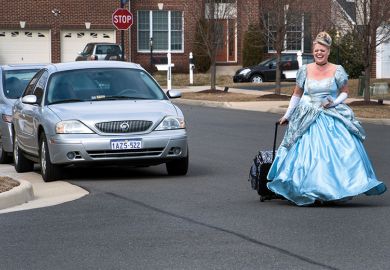The UK risks falling behind rivals in North America and Asia if the country does not seize a “once-in-a-generation opportunity to break down the silos” between universities and the rest of the education sector, Labour has claimed.
Gordon Marsden, shadow higher education minister, told the party’s annual conference that Labour had an “absolute commitment to making lifelong learning a central element of everything that needs to be done in higher education and further education over the next five to 10 years”.
The party’s proposals are built around the creation of a National Education Service, based on the idea that access to education should be universal, free and on a lifelong basis – as with the National Health Service, Mr Marsden explained.
The plan includes abolishing tuition fees in England, but one vice-chancellor urged him not to allow such a policy to bring with it a return of student number controls.
“[The NES] is a once-in-a-generation opportunity to break down the silos in education,” Mr Marsden said, citing the need to remove barriers between further and higher education, and skills, academic and vocational education.
At an event hosted by NeonHE, Mr Marsden warned that closer links between different parts of the education sector were crucial for the UK economy and, if not adopted, the nation would be “colonised” by rival countries in North America and Asia that do take this approach.
He also told the event that there needs to be “a more horizontal model of people collaborating” between higher education and other parts of the system.
“It includes the staff, it includes the lecturers, it includes the management at all levels. The idea that this hierarchy of vice-chancellors…is going to be just maintained as…it had been for 100-150 years, in this new world isn’t going to work.”
Dave Phoenix, MillionPlus chair and London South Bank University vice-chancellor, speaking at the MillionPlus fringe, said that the National Education Service is “a radical idea and like any radical idea it will face challenges – political, logistical and economic”.
He warned that “recognising the cost of education does of course present challenges to the concept of the NES. I wouldn’t want to see a return to number controls, in fact I’d like to see Labour recommit to expanding HE participation with 50 per cent as an absolute baseline.”
Professor Phoenix said part-time students should be an immediate priority for any National Education Service.
He added: “The NES charter Labour has set out gives us a chance to think about the system from first principles that we have not done in decades…From those starting out at primary school, all the way through to mature or part-time learners much later in life, we need a system fit for the modern world.”
POSTSCRIPT:
Print headline: Labour pushes lifelong learning
Register to continue
Why register?
- Registration is free and only takes a moment
- Once registered, you can read 3 articles a month
- Sign up for our newsletter
Subscribe
Or subscribe for unlimited access to:
- Unlimited access to news, views, insights & reviews
- Digital editions
- Digital access to THE’s university and college rankings analysis
Already registered or a current subscriber? Login








